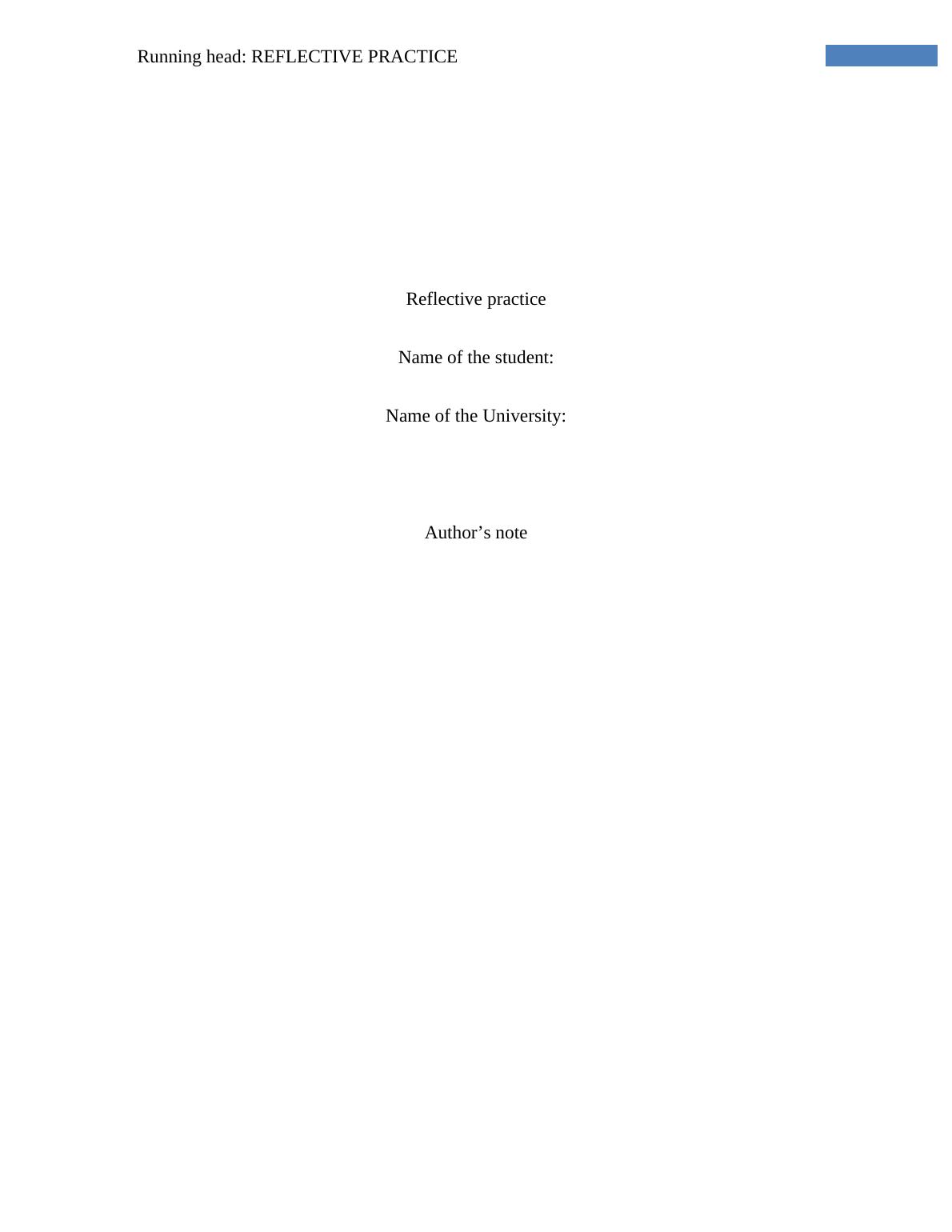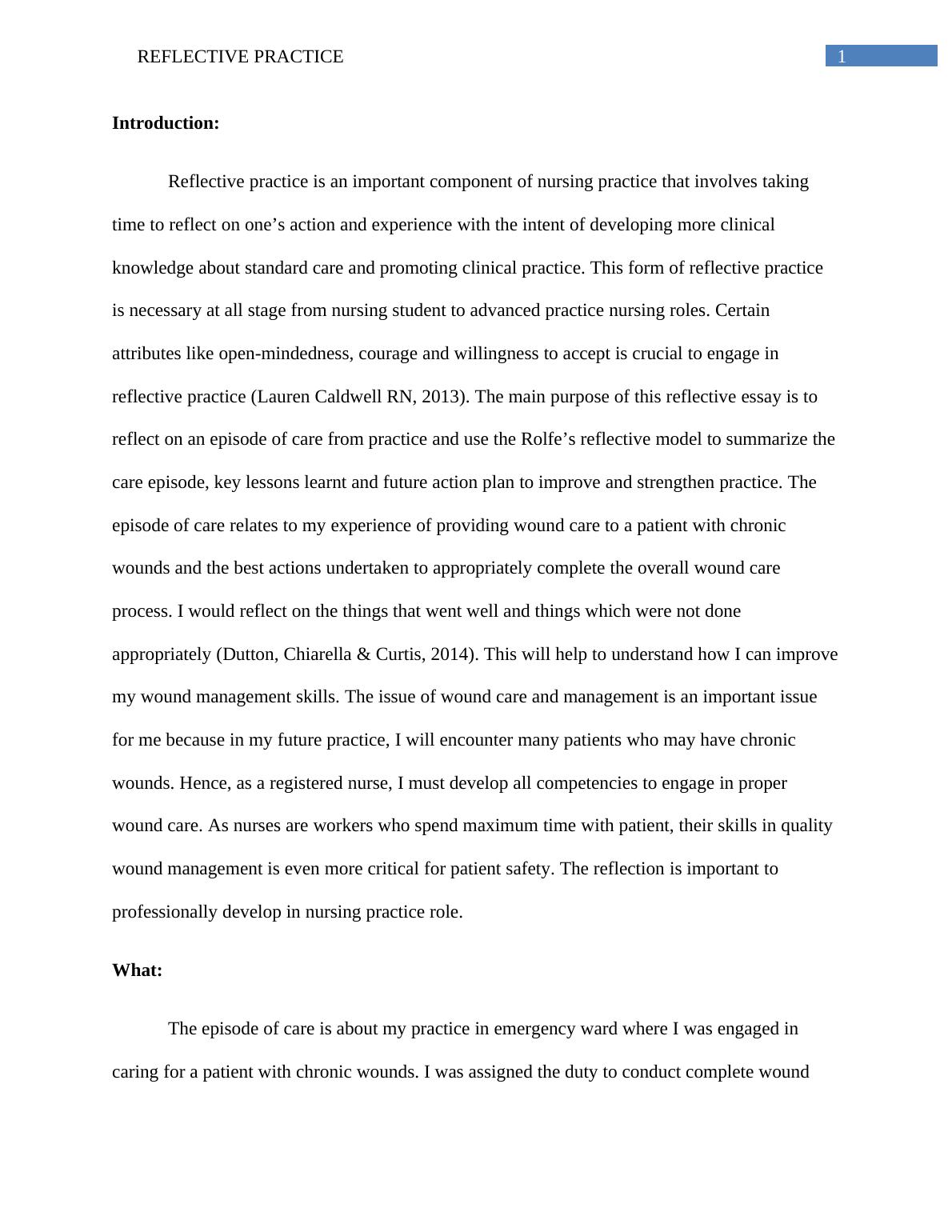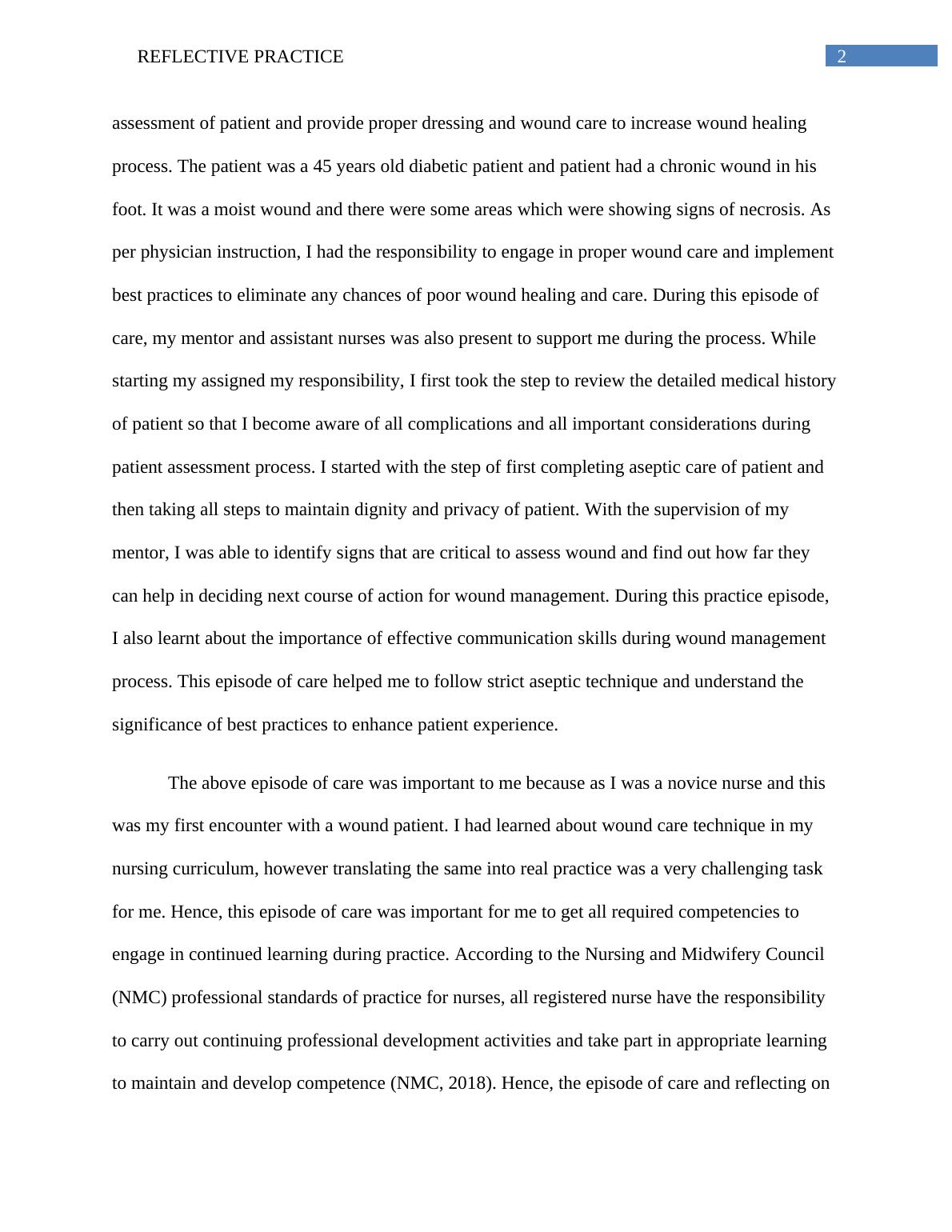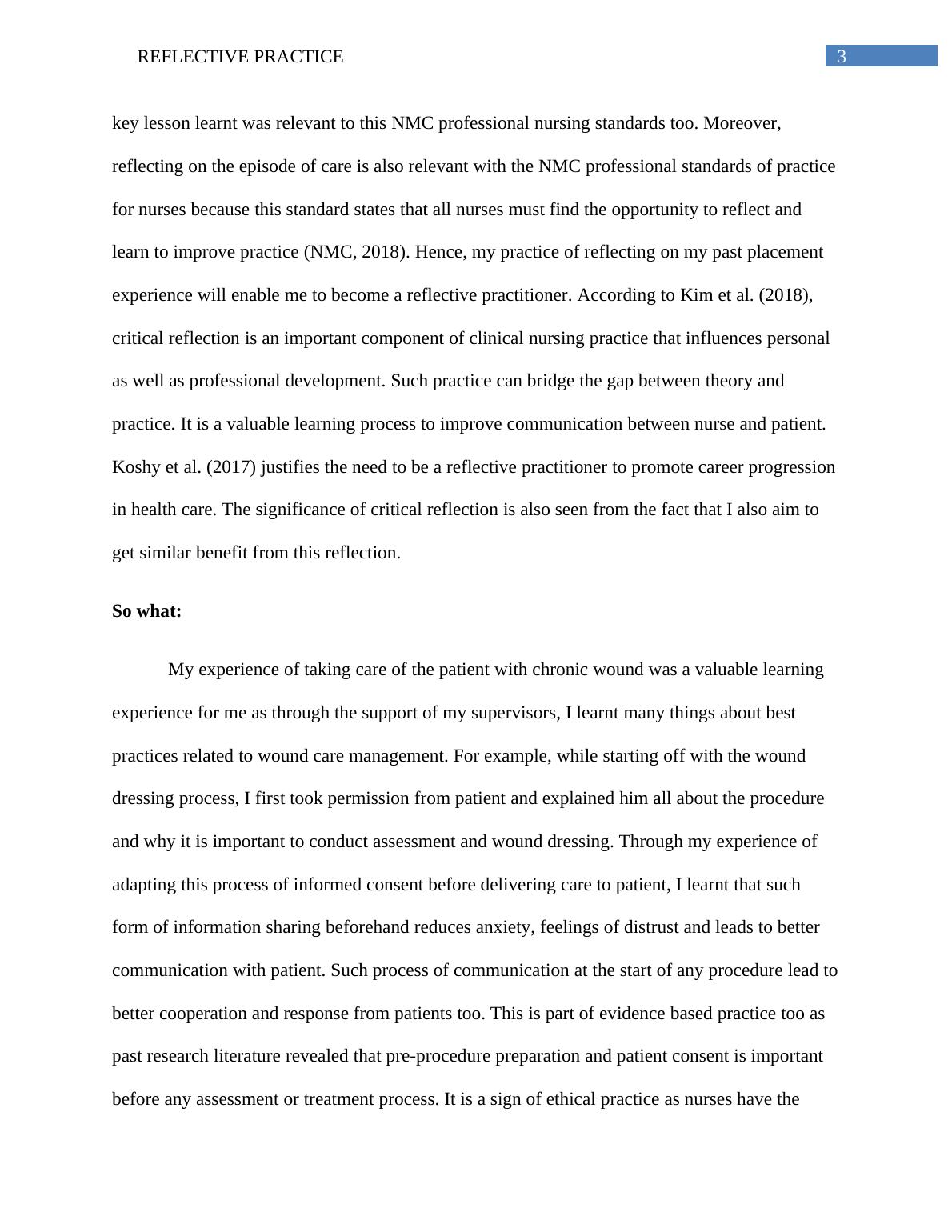Advances in wound Care
13 Pages3653 Words62 Views
Added on 2022-08-22
Advances in wound Care
Added on 2022-08-22
ShareRelated Documents
Running head: REFLECTIVE PRACTICE
Reflective practice
Name of the student:
Name of the University:
Author’s note
Reflective practice
Name of the student:
Name of the University:
Author’s note

1REFLECTIVE PRACTICE
Introduction:
Reflective practice is an important component of nursing practice that involves taking
time to reflect on one’s action and experience with the intent of developing more clinical
knowledge about standard care and promoting clinical practice. This form of reflective practice
is necessary at all stage from nursing student to advanced practice nursing roles. Certain
attributes like open-mindedness, courage and willingness to accept is crucial to engage in
reflective practice (Lauren Caldwell RN, 2013). The main purpose of this reflective essay is to
reflect on an episode of care from practice and use the Rolfe’s reflective model to summarize the
care episode, key lessons learnt and future action plan to improve and strengthen practice. The
episode of care relates to my experience of providing wound care to a patient with chronic
wounds and the best actions undertaken to appropriately complete the overall wound care
process. I would reflect on the things that went well and things which were not done
appropriately (Dutton, Chiarella & Curtis, 2014). This will help to understand how I can improve
my wound management skills. The issue of wound care and management is an important issue
for me because in my future practice, I will encounter many patients who may have chronic
wounds. Hence, as a registered nurse, I must develop all competencies to engage in proper
wound care. As nurses are workers who spend maximum time with patient, their skills in quality
wound management is even more critical for patient safety. The reflection is important to
professionally develop in nursing practice role.
What:
The episode of care is about my practice in emergency ward where I was engaged in
caring for a patient with chronic wounds. I was assigned the duty to conduct complete wound
Introduction:
Reflective practice is an important component of nursing practice that involves taking
time to reflect on one’s action and experience with the intent of developing more clinical
knowledge about standard care and promoting clinical practice. This form of reflective practice
is necessary at all stage from nursing student to advanced practice nursing roles. Certain
attributes like open-mindedness, courage and willingness to accept is crucial to engage in
reflective practice (Lauren Caldwell RN, 2013). The main purpose of this reflective essay is to
reflect on an episode of care from practice and use the Rolfe’s reflective model to summarize the
care episode, key lessons learnt and future action plan to improve and strengthen practice. The
episode of care relates to my experience of providing wound care to a patient with chronic
wounds and the best actions undertaken to appropriately complete the overall wound care
process. I would reflect on the things that went well and things which were not done
appropriately (Dutton, Chiarella & Curtis, 2014). This will help to understand how I can improve
my wound management skills. The issue of wound care and management is an important issue
for me because in my future practice, I will encounter many patients who may have chronic
wounds. Hence, as a registered nurse, I must develop all competencies to engage in proper
wound care. As nurses are workers who spend maximum time with patient, their skills in quality
wound management is even more critical for patient safety. The reflection is important to
professionally develop in nursing practice role.
What:
The episode of care is about my practice in emergency ward where I was engaged in
caring for a patient with chronic wounds. I was assigned the duty to conduct complete wound

2REFLECTIVE PRACTICE
assessment of patient and provide proper dressing and wound care to increase wound healing
process. The patient was a 45 years old diabetic patient and patient had a chronic wound in his
foot. It was a moist wound and there were some areas which were showing signs of necrosis. As
per physician instruction, I had the responsibility to engage in proper wound care and implement
best practices to eliminate any chances of poor wound healing and care. During this episode of
care, my mentor and assistant nurses was also present to support me during the process. While
starting my assigned my responsibility, I first took the step to review the detailed medical history
of patient so that I become aware of all complications and all important considerations during
patient assessment process. I started with the step of first completing aseptic care of patient and
then taking all steps to maintain dignity and privacy of patient. With the supervision of my
mentor, I was able to identify signs that are critical to assess wound and find out how far they
can help in deciding next course of action for wound management. During this practice episode,
I also learnt about the importance of effective communication skills during wound management
process. This episode of care helped me to follow strict aseptic technique and understand the
significance of best practices to enhance patient experience.
The above episode of care was important to me because as I was a novice nurse and this
was my first encounter with a wound patient. I had learned about wound care technique in my
nursing curriculum, however translating the same into real practice was a very challenging task
for me. Hence, this episode of care was important for me to get all required competencies to
engage in continued learning during practice. According to the Nursing and Midwifery Council
(NMC) professional standards of practice for nurses, all registered nurse have the responsibility
to carry out continuing professional development activities and take part in appropriate learning
to maintain and develop competence (NMC, 2018). Hence, the episode of care and reflecting on
assessment of patient and provide proper dressing and wound care to increase wound healing
process. The patient was a 45 years old diabetic patient and patient had a chronic wound in his
foot. It was a moist wound and there were some areas which were showing signs of necrosis. As
per physician instruction, I had the responsibility to engage in proper wound care and implement
best practices to eliminate any chances of poor wound healing and care. During this episode of
care, my mentor and assistant nurses was also present to support me during the process. While
starting my assigned my responsibility, I first took the step to review the detailed medical history
of patient so that I become aware of all complications and all important considerations during
patient assessment process. I started with the step of first completing aseptic care of patient and
then taking all steps to maintain dignity and privacy of patient. With the supervision of my
mentor, I was able to identify signs that are critical to assess wound and find out how far they
can help in deciding next course of action for wound management. During this practice episode,
I also learnt about the importance of effective communication skills during wound management
process. This episode of care helped me to follow strict aseptic technique and understand the
significance of best practices to enhance patient experience.
The above episode of care was important to me because as I was a novice nurse and this
was my first encounter with a wound patient. I had learned about wound care technique in my
nursing curriculum, however translating the same into real practice was a very challenging task
for me. Hence, this episode of care was important for me to get all required competencies to
engage in continued learning during practice. According to the Nursing and Midwifery Council
(NMC) professional standards of practice for nurses, all registered nurse have the responsibility
to carry out continuing professional development activities and take part in appropriate learning
to maintain and develop competence (NMC, 2018). Hence, the episode of care and reflecting on

3REFLECTIVE PRACTICE
key lesson learnt was relevant to this NMC professional nursing standards too. Moreover,
reflecting on the episode of care is also relevant with the NMC professional standards of practice
for nurses because this standard states that all nurses must find the opportunity to reflect and
learn to improve practice (NMC, 2018). Hence, my practice of reflecting on my past placement
experience will enable me to become a reflective practitioner. According to Kim et al. (2018),
critical reflection is an important component of clinical nursing practice that influences personal
as well as professional development. Such practice can bridge the gap between theory and
practice. It is a valuable learning process to improve communication between nurse and patient.
Koshy et al. (2017) justifies the need to be a reflective practitioner to promote career progression
in health care. The significance of critical reflection is also seen from the fact that I also aim to
get similar benefit from this reflection.
So what:
My experience of taking care of the patient with chronic wound was a valuable learning
experience for me as through the support of my supervisors, I learnt many things about best
practices related to wound care management. For example, while starting off with the wound
dressing process, I first took permission from patient and explained him all about the procedure
and why it is important to conduct assessment and wound dressing. Through my experience of
adapting this process of informed consent before delivering care to patient, I learnt that such
form of information sharing beforehand reduces anxiety, feelings of distrust and leads to better
communication with patient. Such process of communication at the start of any procedure lead to
better cooperation and response from patients too. This is part of evidence based practice too as
past research literature revealed that pre-procedure preparation and patient consent is important
before any assessment or treatment process. It is a sign of ethical practice as nurses have the
key lesson learnt was relevant to this NMC professional nursing standards too. Moreover,
reflecting on the episode of care is also relevant with the NMC professional standards of practice
for nurses because this standard states that all nurses must find the opportunity to reflect and
learn to improve practice (NMC, 2018). Hence, my practice of reflecting on my past placement
experience will enable me to become a reflective practitioner. According to Kim et al. (2018),
critical reflection is an important component of clinical nursing practice that influences personal
as well as professional development. Such practice can bridge the gap between theory and
practice. It is a valuable learning process to improve communication between nurse and patient.
Koshy et al. (2017) justifies the need to be a reflective practitioner to promote career progression
in health care. The significance of critical reflection is also seen from the fact that I also aim to
get similar benefit from this reflection.
So what:
My experience of taking care of the patient with chronic wound was a valuable learning
experience for me as through the support of my supervisors, I learnt many things about best
practices related to wound care management. For example, while starting off with the wound
dressing process, I first took permission from patient and explained him all about the procedure
and why it is important to conduct assessment and wound dressing. Through my experience of
adapting this process of informed consent before delivering care to patient, I learnt that such
form of information sharing beforehand reduces anxiety, feelings of distrust and leads to better
communication with patient. Such process of communication at the start of any procedure lead to
better cooperation and response from patients too. This is part of evidence based practice too as
past research literature revealed that pre-procedure preparation and patient consent is important
before any assessment or treatment process. It is a sign of ethical practice as nurses have the

End of preview
Want to access all the pages? Upload your documents or become a member.
Related Documents
Wound Management Gap in Educationlg...
|5
|891
|287
Self-directed CPD Evidence Record for Nursinglg...
|8
|872
|38
Self Directed Continuing Professional Development for Nurses and Midwiveslg...
|5
|1031
|31
Gibb's Reflectionlg...
|5
|1034
|498
Wound Dressing Assignment 2022lg...
|5
|1042
|12
Reflective Journal on Nursing Practice in Aged Care Unitlg...
|11
|2745
|68
